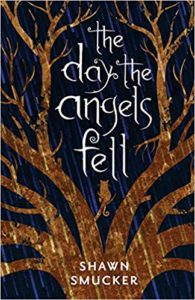Fiction Friday: The Day The Angels Fell by Shawn Smucker
The Day The Angels Fell
by Shawn Smucker
The Day The Angels Fell is a finalist in the 2018 Christy Awards, Visionary category.
INTRODUCTION—The Day The Angels Fell
It was the summer of storms and strays and strangers. The summer that lightning struck the big oak tree in the front yard. The summer his mother died in a tragic accident. As he recalls the tumultuous events that launched a surprising journey, Samuel can still hardly believe it all happened.
After his mother’s death, twelve-year-old Samuel Chambers would do anything to bring her back. Prompted by three strange carnival fortune-tellers and the surfacing of his mysterious and reclusive neighbor, Sam begins his search for the Tree of Life–the only thing that could possibly bring his mother back. His quest to defeat death entangles him and his best friend Abra in an ancient conflict and forces Sam to grapple with an unwelcome question: could it be possible that death is a gift?
THE DAY THE ANGELS FELL — EXCERPT
 I am old now. I still live on the same farm where I grew up, the same farm where my mother’s accident took place, the same farm that burned for days after the angels fell. My father rebuilt the farm after the fire, and it was foreign to me then, a new house trying to fill an old space. The trees he planted were all fragile and small, and the inside of the barns spelled like new wood and fresh paint. I think he was glad to start over, considering everything that summer had taken from us.
I am old now. I still live on the same farm where I grew up, the same farm where my mother’s accident took place, the same farm that burned for days after the angels fell. My father rebuilt the farm after the fire, and it was foreign to me then, a new house trying to fill an old space. The trees he planted were all fragile and small, and the inside of the barns spelled like new wood and fresh paint. I think he was glad to start over, considering everything that summer had taken from us.
But that was many years ago, and now the farm feels old again. The floorboards creak when I walk to the kitchen in the middle of the night. The walls and the roof groan under the weight of summer storms. There is a large oak in the front yard again, and it reminds me of the lightning tree, the one that started it all. This house and I are two old friends sitting together in our latter days.
I untie my tangled necktie and try again. I’ve never been good at these knots. My last friend’s funeral is this week and I thought I should wear a tie. It seemed the right thing to do, but now that I’m standing in front of a mirror I’m having second thoughts, not only about the necktie but about even going. She was my best friend, but I’m not sue I have the strength for one more funeral.
Someone knocks on the front door, so I untangle myself from the tie and ease my way down the stairs, leaning heavily on the handrail. Another knock, and by now I’m crossing to the door.
“Coming, coming,” I say. People are in such a hurry these days. Everyone wants everything to happen now, or yesterday. But when you’re my age, you get used to waiting, mostly because you’re always waiting on yourself.
“Hi there, Jerry,” I say through the screen, not making any move to open it.
“I won’t come in Samuel. Just wanted to apologize for my boy again.”
Jerry is a huge bear of a man with arms and hands and fingers so thick I sometimes wonder how he can use them for anything small like tying shoes or stirring his coffee. He’s always apologizing for his boy. I don’t know why—seems to me his boy simply acts like a boy. And because Jerry is always calling him “boy,” I can’t remember the child’s name.
“I heard he was throwing smoke bombs up on your porch this morning.”
“Oh, that. Well . . .” I begin.
“I won’t hear of it,” Jerry says. “In fact, as soon as I find him he’ll be coming here in person to apologize.”
“That’s really not necessary,” I say.
“No. That boy will apologize.”
I sigh. “Anything else, Jerry? How are the fields this summer?”
“Green. It’s been a good one so far.”
“All right,” I mumble, then turn and walk away because I’m too old to waste my time having conversations that don’t interest me. “All right.”
“Oh, and I’m sorry about your friend,” Jerry calls to me as I begin the slow ascent up the stairs. His words hit me like a physical object, making me stop on the third step and lean against the wall. They bring a fresh wave of grief to the surface, and I’m glad he can’t see my face.
“Thank you,” I say, hoping he will leave now.
“The missus says she was a good, close friend of yours for many years. I’m very sorry.”
“Thank you,” I say again, then start climbing he stairs. One foot after the other, that’s the only way to do it. I wish people would mind their own business. I have no interest at my age in collecting the sympathy of strangers. Or near strangers. In fact, I cn do without sympathy at all, no matter the source.
I still imagine myself to be self-sufficient, and in order to maintain that illusion I keep a small garden at the end of the lane. Sometimes, while I’m weeding, I’ll stop and look across the street at where the old church used to be. After the fire they left the lot vacant and rebuilt the small brick building on a lot in town, but the old foundation is still there somewhere, under the dirt and the plants and the trees that came over the years. Time covers things, but that doesn’t mean they’re gone.
If I’m honest, though, I have to admit that during some gradual phase in my life I became too old to work the farm myself. There was a time not long ago when my farm fell into disrepair, and I thought it would be the end of me as well, because I couldn’t bear to watch so many memories collapse in on themselves. Then the family that moved into Abra’s old farm, Jerry and “the missus” and his “boy,” asked if they could rent my fields and barns. I said yes because I had no good reason to say no. Now they take care of everything and I live quietly in the old farmhouse, puttering in my garden or sitting on the front porch, trying to remember all the things that happened the summer my mother died.
Jerry’s son looks to be about eleven or twelve, my age when it happened. I wonder what he would do if his mother died.
I think he’s scared of me, and I don’t blame him. I don’t shave very often and my hair is usually unruly. My clothes are old and worn. I know I smell of old age—I remember that scent from when my father started walking with a cane.
Sometimes Jerry’s son will hide among the fruit trees that line the long lane and spy on me, but I don’t mind. I pretend not to see him, and he seems to have fun with it, climbing up to the highest branch and peering through an old tube as if it’s a telescope. Sometimes, though, when he gets to the top, I find myself holding my breath, waiting for him to fall. Everything falls in the end, you know.
 AUTHOR BIO—SHAWN SMUCKER
AUTHOR BIO—SHAWN SMUCKER
Shawn Smucker is an author and co-writer who lives in Lancaster, Pennsylvania. He is married and has six children. The Day The Angels Fell is a finalist in the 2018 Christy Awards, Visionary category. You can learn more about Shawn at his web site — http://shawnsmucker.com/












































Sounds like it has good potential for some Southern/Midwest Gothic and Jungian mysticism (i.e., English major fodder). The trouble would be finding it in a library if it’s this new.